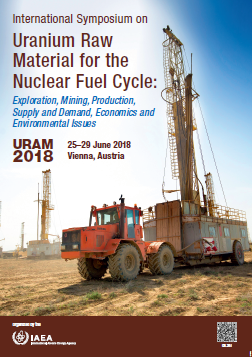Adequate services, expertise and modern technologies are needed to ensure a sustainable supply of uranium raw materials to fuel both operating and future nuclear power reactors. Effective regulation, sound environmental management, training and education are required to minimize the impact of uranium mining and production and to contribute to public acceptance of the global nuclear industry in general. In 2005, 2009 and 2014, the International Atomic Energy Agency (IAEA) hosted International Symposia on Uranium Production and Raw Materials for the Nuclear Fuel Cycle1 at its Headquarters in Vienna, Austria, to discuss all aspects of uranium raw materials for the uranium fuel cycle to ensure the long term sustainability of a nuclear power programme. In response to a challenging economic environment, the industry is currently seeking new and innovative ways to improve efficiencies in producing uranium. Since 2016 the long term median forecast envisages the growth of nuclear power worldwide, thereby leading to an eventual increase in uranium demand and in turn the price of uranium. In the last few years uranium supply has exceeded consumption, leading to historically low spot prices for uranium oxide. This has resulted in decreased exploration activity as well as in some mines being placed in care and maintenance. Looking forward, secondary uranium supplies are expected to dwindle. This, combined with the exhaustion of some active uranium mines, requires that the uranium resource base and global production capacity be further advanced in order to meet current and future demands. The current oversupply could potentially lead to undersupply in the medium to long term. Due to long lead times from discovery to production, the re-evaluation of uranium resources is required now.
The long term sustainability of nuclear power will depend on, among several factors, an adequate supply of uranium resources that can be delivered to the marketplace at competitive prices. New exploration technologies and a better understanding of the recognition criteria and genesis of the uranium ores will be required to discover and delineate increasingly difficult-to-locate uranium deposits, particularly those of low cost. In addition, exploration, mining and milling technologies should be environmentally benign, and site decommissioning plans need to meet the requirements of increasingly stringent environmental regulations and societal expectations. The purpose of the symposium is to analyse uranium supply and demand scenarios and to present and discuss new developments in uranium geology, exploration, mining, milling and processing, as well as the environmental requirements for uranium operations and site decommissioning. The presentations and discussions at URAM-2018 will:
- Lead to a better understanding of the adequacy of uranium supply to meet future demand;
- Provide information on geological models, new exploration concepts, knowledge and technologies that may potentially result in the discovery and development of new uranium resources;
- Describe new mining and processing technologies that have the potential to support a more efficient and sustainable development of uranium and related resources; and
- Consider the environmental compatibility of uranium production and the overall effectiveness of progressive waste management, decommissioning and remediation of production facilities.
URAM-2018 is intended to bring together scientists, managers, exploration and mining geologists, mineral economists, engineers, operators, regulators, community representatives, social scientists, nuclear fuel cycle and environmental specialists and young professionals to exchange information and discuss updated research and current issues related to uranium geology and deposits, exploration, mining and processing, production economics and environmental and legal issues.
More info can be found here: https://www.iaea.org/events/uram-2018

